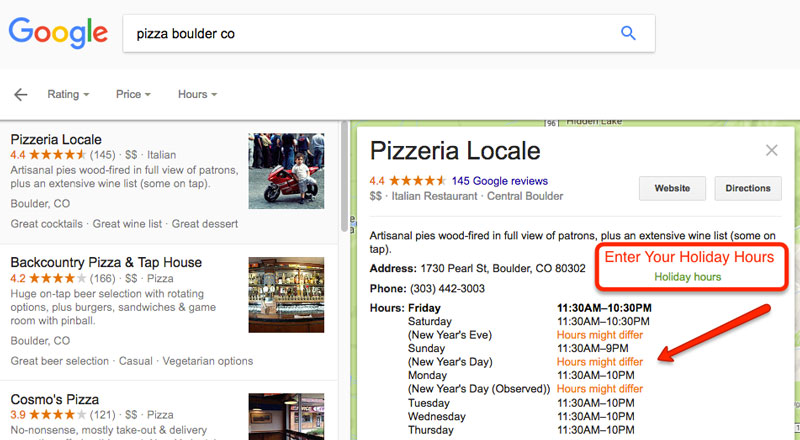Labeling your business’s operating hours in structured data (Schema.org code) can be a great addition to your website as search engines, such as Google and Bing, continue to utilize structured data more and more in their search results pages (SERPs).
But what do you do for the holidays when your operating hours may be different?
 There’s two things you can do:
There’s two things you can do:

Google and the Google logo are registered trademarks of Google Inc., used with permission.
- Login to your Google My Business account and manually enter in your holiday hours. Google does recognizes schema.org markup but the only guaranteed way to have your holiday hours listed in Google search results is by entering them in Google My Business.
- Have your holiday hours in text format somewhere on the page/website and either markup that text with microdata or place the new hours in JSON-LD format somewhere on the page as well using the specialOpeningHoursSpecification property. JSON-LD format is recommended, see examples below.
Structured Data for Holiday Hours
Schema.org defines the specialOpeningHoursSpecification property as “the special opening hours of a certain place” and explicitly states that this property will “override general opening hours brought in scope by openingHoursSpecification or openingHours“. JSON-LD Format Example"specialOpeningHoursSpecification": {
"@type": "OpeningHoursSpecification",
"opens": "09:00",
"closes": "14:00",
"validFrom": "2017-11-23",
"validThrough": "2017-11-23"
}"specialOpeningHoursSpecification": [{
"@type": "OpeningHoursSpecification",
"opens": "00:00",
"closes": "00:00",
"validFrom": "2017-12-25",
"validThrough": "2017-12-25"
},{
"@type": "OpeningHoursSpecification",
"opens": "09:00",
"closes": "14:00",
"validFrom": "2018-01-01",
"validThrough": "2018-01-01"
}]
Structured Data for Seasonal Hours
If you’re doing Schema for a business that is closed for a particular season or extended period of time, utilize the openingHoursSpecification property and the validFrom and validThrough sub-properties to specify the exact dates of your off-season. JSON-LD Format Example"openingHoursSpecification": {
"@type": "OpeningHoursSpecification",
"opens": "00:00",
"closes": "00:00",
"validFrom": "2016-12-01",
"validThrough": "2017-03-01"
}
The following two tabs change content below.


Ryan Bradley
Co-Founder at Authority Networks®
Latest posts by Ryan Bradley (see all)
- Desktop vs Mobile Search Results on Google - December 10, 2021
- How to Add Facebook Comments on WordPress Without Using A Plugin - September 26, 2020
- How to Implement HowTo Schema - May 14, 2020


